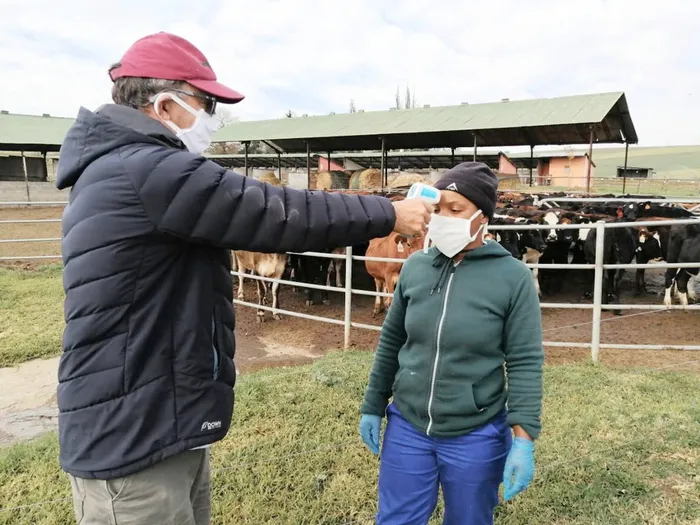KZN Midlands farmers taking no chances after first Covid-19 case

Mearns Farm dairy farmer James Kean taking Thobeka Dlamini's temperature before the start of a shift. Picture: Nkululeko Nene Mearns Farm dairy farmer James Kean taking Thobeka Dlamini's temperature before the start of a shift. Picture: Nkululeko Nene
Durban – Farmers in the KwaZulu-Natal Midlands are taking no chances after the first confirmed case of Covid-19 in Mpofana was reported last week.
The outbreak also resulted in the Mooi River police station being shut down, with officers being placed in self-isolation after interacting with a 63-year-old man from Bruntville who had tested positive for the virus.
SAPS spokesperson Brigadier Vish Naidoo confirmed the police station was temporarily shut down last Saturday but was reopened on Thursday morning after decontamination.
Last week’s incident prompted farmers to dispatch a tractor to sanitise the whole township.
Leading the scheme campaign, James Kean, chairperson of Umati (Upper Midlands Transformation Initiative), said commercial farmers were concerned about the well-being of their neighbours along the N3.
He said the spread of the disease could infect more people, including farmworkers who lived in the area. He said when a sick employee was not allowed to work, it compromised the productivity on his farm. He said an infection on his farm could harm his business.
Kean, of Mearns Farm, which produces about 200 litres of milk a day for Danone products, said he always stressed the point of cleanliness: every worker had to be screened for temperature before being sprayed with a sanitiser when reporting for duty.
On Wednesday morning, Kean was seated with his laptop preparing a list of beneficiaries for food parcels while liaising with other farmers who were willing to contribute.
When the Sunday Tribune visited Bruntville, it was clear the outbreak had caused a scare - the Lighthouse Community Hall, a feeding place for the destitute, was relatively empty.
“The standard food parcel is maize, samp, beans, toilet paper, sugar, salt and cooking oil. Farmers have generously donated things like potatoes and spinach and dairy products including sour milk,” said Kean.
His business friend Lincoln Wait, a director at Mooi River Spar, said his shop was still standing because of support from the community.
He said he could not fold his arms when his neighbours were suffering because of the lockdown restrictions. “Your community is so important; if you do not look after it, your business won’t succeed. Contributions are unbelievable, from farmers feeding families to donating 500 grocery parcels.”
Gregory Rhadebe, a teacher at Bruntville Primary School, said the destitute were stopped from coming to collect cooked meals at the Lighthouse.
Rhadebe said they would only proceed after assessing the situation and when it was safe to do so. He said residents from the poverty-stricken township next to the toll plaza with about 75% of people unemployed had made the hall a second home.
Rhadebe, with the help of the farmers, businesspeople and community-based organisations, have been able to provide cooked meals to hundreds of people.
He said on certain days farmers handed food parcels to about 500 households. Rhadebe, who uses his van to distribute to beneficiaries too frail to come to the hall, said he feared that with winter approaching, too many people would be infected if precautions were not followed.
“The spread of the virus could be vicious because in the cold winter season the temperature drops to below 1°C in June. But with a warm healthy meal and soup ready for consumption, beneficiaries who have chronic illness will be able to take their medication,” he said.
Farmers contributed to the poverty alleviation project through donating seedlings, compost and other farming implements to the community hall.